
OU DAILY G U I D E EXPRESSIONS DECEMBER 2022 OUDAILY.COM OKLAHOMA SPJ’S 2022 FIRST AMENDMENT AWARD WINNER
OF THE COMMUNITY
VOICES


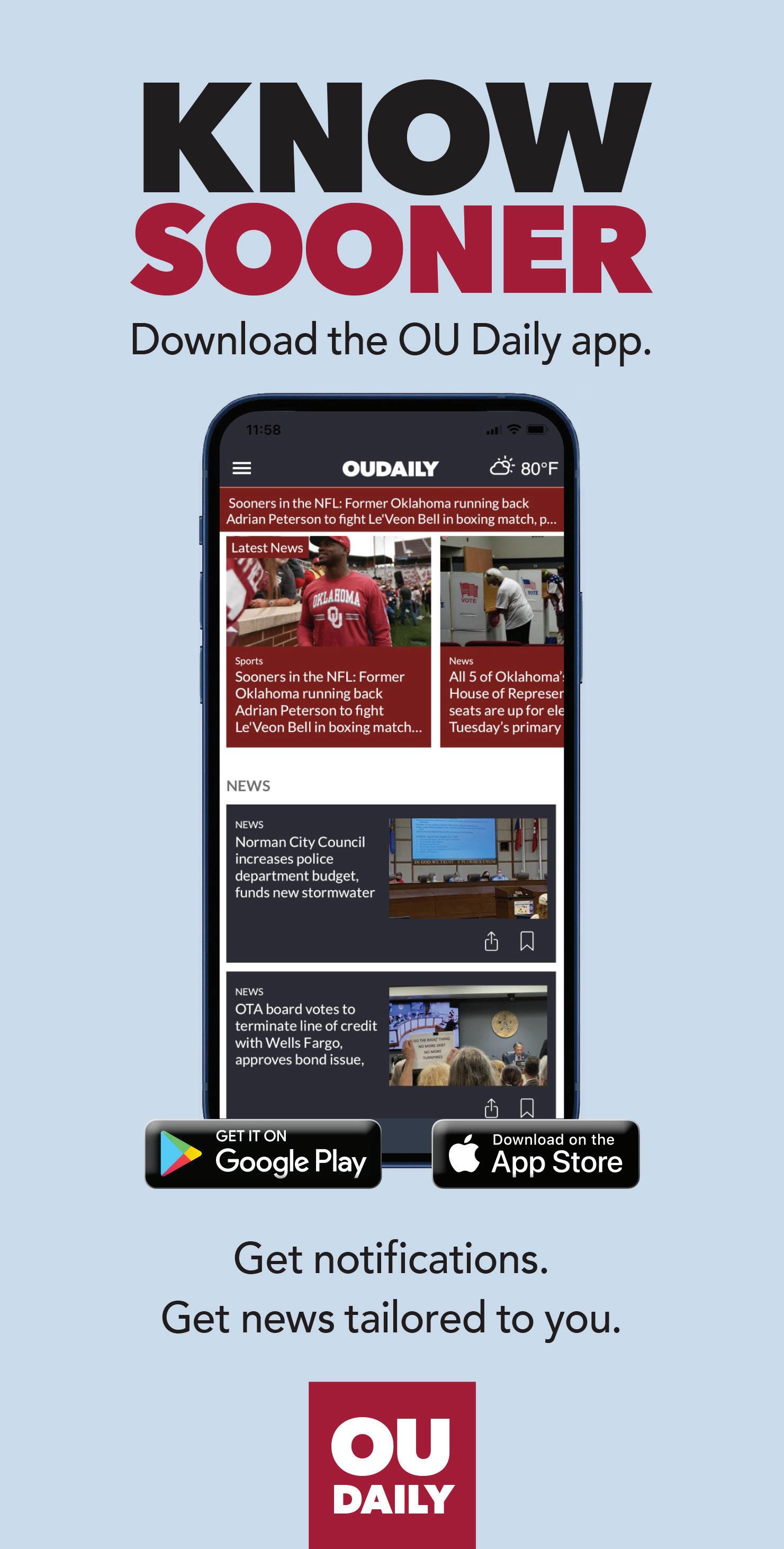
2 • December 2022 EXPRESSIONS DODGE FAMILY COLLEGE OF ARTS AND SCIENCES THE SCHUSTERMAN CENTER FOR JUDAIC & ISRAEL STUDIES The UNIVERSITY of OKLAHOMA Study in Isr ael Scholar ships 2023-24 AWARD TERMS : Summer : $5,000 | Fall/Spring: $10,000 *Students are welcome to apply for multiple awar d ter ms. SO MANY THINGS TO DO ! STEM | Fine Ar ts | Business | Law Ar chaeological Digs | Religious Studies Langua ge Immer sion Middle Easter n Studies | Isr ael Studies ELIGIBILITY OU UNDERGRADUAT E & GRADUAT E STUDENT S 15 HOURS COLLEGE COURSEW OR K BY DEADLINE ALL MAJOR S AN D MINOR S 2.5 OVERALL GPA* *3.0 GPA in any in JuSt or Hebrew cour ses taken. Priority given to major s/minor s in Judaic & Israel Studies or Hebrew. Reach out to Education Abroad If you plan to appl y for a scholar ship. (abritton@ou.edu) DEADLINE: 02/06/23 AT MIDNIGHT SCAN QR CODE TO APPLY
MISSION
OU Daily, the independent student voice of the University of Oklahoma since 1916, covers the community and provides a public forum to discuss its issues while providing students on our sta real-world media experiences.
MASTHEAD
JILLIAN TAYLOR
ALEXIA ASTON
MASON YOUNG SILAS BALES
RAY BAHNER
FRANCISCO GUTIERRE Z
BELLA AVILA
CONNIE
WIGGINS
SETH PRINCE
Editor-in-chief News managing editor Sports editor Culture editor Photo editor Copy chief Copy chief Design editor Newsroom adviser
CONTACT US
160 Copeland Hall, 860 Van Vleet Oval, Norman, OK 73019
BUSINESS OFFICE: 405-325-2521 | studentmedia@ou.edu
NEWSROOM: 405-325-3666 | dailynews@ou.edu ADVERTISING: 405-325-2521 | dailyads@ou.edu
OPINIONS & SUBMISSIONS
Letters to the editor or guest columns may be submitted to dailyeditor@ou.edu. ey will be edited for accuracy, space and style and run at the discretion of the editor-in-chief. Students must list their major and classi cation; faculty or sta must list their title. Our Views are the view of the Editorial Board. Opinions are not necessarily those of the Editorial Board.
LEGAL
One free copy is available to members of the community. Extra copies may be purchased. efts are subject to legal action.
CORRECTIONS
OU Daily is committed to accuracy. If you nd an error in our work, submit a correction at oudaily.com/corrections.
FIND US ONLINE
oudaily.com oudaily.com/newsletters oudaily.com/archive oudaily.com/jobs oudaily.com/donate oudaily ousoonerscentral @oudaily @oudailysports @theoudaily
December 2022 • 3 EXPRESSIONS INSIDE
ACTION CASE REKINDLES DISCOURSE 15
AFFIRMATIVE
HOME PAGE NEWSLETTERS PRINT ARCHIVES JOIN US DONATE FACEBOOK SPORTS FACEBOOK TWITTER SPORTS TWITTER INSTAGRAM OU DAILY G U I D E WRITING A PATH TO PURPOSE, A NEW LIFE 4 WHAT DOESN’T MAKE THE CUT FOR INSTAGRAM 7 ACADEMIC EXPRESSION, FREE SPEECH ON CAMPUS 10 2022 HIGHLIGHT REEL 12 HEAR THE CRIES OF INJUSTICE IN IRAN 13 ‘FROM 2022 ON’: PANDEMIC YEARS IN REVIEW 14
Writing a path to purpose, a new life
Learned Journalism senior brooklyn.p.learned@ou.edu
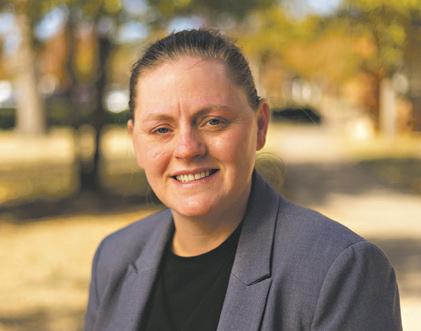

Standing in front of the mirror, admiring my black graduation gown with my first-generation stole draped around my neck, I envision walking across the stage Dec. 17 to receive my journalism degree from OU.
Like all graduates, I feel grateful. I feel worthy. I feel proud.
Also, it feels miraculous. I have beat all odds.
Growing up, I never imagined going to college. I stopped engaging in school in fifth grade. I dropped out at 16. Growing up, I had no idea about the importance of an education.
My parents got divorced when I was 6, and they would get back together between my mom’s four other failed marriag es. My mom had bipolar disorder and was often in and out of mental hospitals. My dad was an abusive drug addict who cried and yelled most of the time. Between ages 6 and 17, I lived in 27 different homes in Oklahoma City.
Through it all, my only way of escaping my dysfunctional home life was writing.
I used to sit alone, writing about anything and everything I could think of. Writing was an escape that took me to a place where I could feel good about myself. Writing was my only comfort until I was 11, when I took my first drink of alcohol
Convocation Information:
Gibbs College of Architecture
4:30 p.m. Dec. 16
Gould Hall
830 Van Vleet Oval
Dodge Family College of Arts and Sciences
7 p.m. Dec. 16
Lloyd Noble Center
2900 S. Jenkins Ave.
Atmospheric and Geographic Sciences
4 p.m. Dec. 17
Reynolds Performing Arts Center 560 Parrington Oval
Price College of Business First Ceremony
5 p.m. Dec. 17
Second Ceremony
8 p.m. Dec. 17
T. Howard McCasland
Field House
151 W. Brooks St.
Mewbourne College of Earth and Energy 1:30 p.m. Dec. 17
Reynolds Performing Arts Center 560 Parrington Oval
4 • December 2022 EXPRESSIONS
CANDID COLOR PHOTOGRAPHY
Brooklyn Learned in regalia holding diploma.
Brookyn
and suddenly — finally — felt comfortable in my skin.
Being intoxicated allowed me to feel like I could be someone great, but the only action I took amid those fleeting feelings was another drink.
Soon, I gave away what I thought was any chance of having a good life. And, in doing so, I gave away my passion for writing and forgot about the comfort and courage it brought me.
I became homeless for the first time when I was 19. My ad dictions and destructive behavior held me captive in a vicious cycle for years. The maddening loneliness and slew of conflict ing emotions were almost too much to bear at times. Being homeless was dehumanizing. My reflection was becoming al most unrecognizable.
In a period of recovery, I managed to obtain my GED at 24. There was a graduation ceremony. I invited my family, wore re galia and walked across the stage. But no one showed up to cel ebrate my accomplishment. I felt more disappointment than pride.
About three years later, I became homeless in Norman. I will never forget the day. I had solid blisters on the bottom of my feet from walking for so long in the rain because I had nowhere to go. I felt so helpless and humiliated.
Ten years later, walking down the streets of Norman with a backpack on my back looks a lot different. I once slept on the sidewalk near Campus Corner, where I awoke to laughter from a group of tailgaters on game day. Today, I get the honor of walking across campus with a pen and paper in my backpack, ideas in my brain and dreams in my heart.
Dreams of telling other people’s stories. At 38, I have awoken to my potential to live a life better than I could have imagined.
A gown of blue I hit bottom one day in 2018 and was left with two choices: die or go up.
That came when I found myself gazing at my reflection in the hazy, fake glass of a mental hospital mirror during my ninth visit to that ward in four years. In the midst of a horrifying, sub stance-induced psychosis, I saw something that both terrified and empowered me. I was seven months pregnant with my third child, who would be my first daughter.
I had lost rights to my two previous children, and the thought of losing another was so horrific that I knew I had to try to make a change. If I didn’t, I would not be able to survive on the streets anymore.
I feared more loss would be the death of me.
In that place of peril and possibility, I hallucinated. I feared I was about to be launched into space, to either fall forever or disintegrate by astronomic pressure. I thought I would either die and be on fire forever in hell or be kept alive in a giant, septic,
electrical chamber while being tortured by my fellow homeless community.
The only clothes I owned had been taken by the hospital staff to be washed, as if any part of myself could be made clean again.
Ashamed, I stared at myself in an oversized, 1940s hot-blue nightgown like my poverty-stricken, paternal grandma wore while tending her green beans and roses. She never seemed happy.
I shuddered at the thought of ending up alone without any joy forever.
‘It is my strength’
I was terrified when I walked away from that mirror that I would forget what I looked like and that my prayers would never be answered.
But they were answered. Now, I feel about myself just as James said in the Bible, “I look into the perfect law of liberty, and I am blessed indeed.”
After walking away from that mirror a little over four years ago, I haven’t taken a drink of alcohol.
I have built a new life.
Unlike the person I was at 11, when I took my first drink and embraced escape, I now allow myself to feel my feelings while still making healthy choices.
I went from that mental hospital to the same rehab I had been to eight times before. It’s nothing short of a miracle that I’ve been able to keep my 4-year-old daughter and retain my recovery.
I am a single parent, and it is not a weakness for which I need pity. It is my strength.
After getting out of rehab, with the help of a faith-based orga nization, I was given the opportunity to return to school. When deciding what to pursue, I remembered my love for writing and decided journalism is where I might do the most good.
I started at Oklahoma City Community College in 2019. I be came a writer and editor for the Pioneer student newspaper, and the stories I covered helped to bring about needed change by exposing truth that motivated community engagement. In 2021, I transferred to OU, which has been such a healing expe rience. My feet are no longer blistered, and I am not helpless. I will walk with a sunny disposition and earn my degree with a sense of great pride.
I have paid my way through college with grants and scholar ships and have not had to take out any student loans. However, I will forever be indebted to my education, which has given me so much.
Education, the very thing I took for granted as a child, is now the tool that gives me the power to overcome my past.
Education has given me confidence in who I am today and who I can be in the future.
My journey once left me devastatingly broken, but I was never destroyed. I was almost — but never totally — hopeless.
I have worked hard to be where I am today. I am happily fighting for where I’ll be tomorrow. And I am winning.
Today, as I gaze into the mirror, I see someone looking to the future with a newfound determination to return to one of my earliest comforts. I look to the world again and write about it, not to escape but to foster understanding.
I possess a clarity of vision and determination to tell stories that hold up a mirror to connect people who otherwise might not see one another.
I have a purpose and a voice, one I’m determined to use for the voiceless.
I write to rehumanize, compel, inform and motivate. Both as a productive member of society and in a profession where I’m earning the trust and respect of a community. Neither of which I felt worthy of for so long.
But writing is not just what I do — it is who I am. I am a writer.
I am a storyteller. I am a journalist.
As I declare those four words — I am a journalist — I find long-sought comfort in my own skin.
Truth as a gateway
I am humbled by the privilege and responsibility of being a journalist, where I can help shape the future by cutting through false information to illuminate truth. All the more because writ ing has been the key that unlocked the gateway to my liberation.
Journalism is a part of the foundation on which people re late to the world. Like standing in front of a mirror that hides no flaws, journalism lays bare the facts and exposes truths. Only in facing them clear-eyed — as individuals or as communities — can we unlock the gates that hold us back from becoming our best selves.
As a journalist, I view myself not as a gatekeeper but as a writ er of stories that are gateways to the truths of people’s lives. After that, it’s up to each individual — like in my own ongoing jour ney — to decide which door they go through.
Before walking away from the mirror, imagining myself soon walking across that graduation stage, I smiled and reflected on the gateway that day will mark.
“You did it,” I told myself. “You made it through.”
Brooklyn Learned is a journalism senior at Gaylord College, editorial intern and freelance writer, and — soon — first-genera tion graduate from the University of Oklahoma.
Rainbolt College of Education
1:30 p.m. Dec. 17
Paul F. Sharp Concert Hall
Catlett Music Center
500 W. Boyd St.
Gallogly College of Engineering 1:30 p.m. Dec. 17
T. Howard McCasland Field House 151 W. Brooks St.
Weitzenhoffer Family College of Fine Arts
7 p.m. Dec. 16
Reynolds Performing Arts Center
560 Parrington Oval
Boren College of International Studies 10 a.m. Dec. 17
Reynolds Performing Arts Center 560 Parrington Oval
Gaylord College of Journalism and Mass Communication
10 a.m. Dec. 17
T. Howard McCasland Field House
151 W. Brooks St.
College of Professional and Continuing Studies 10 a.m. Dec. 17
Paul F. Sharp Concert Hall
Catlett Music Center 500 W. Boyd St.
EXPRESSIONS December 2022 • 5

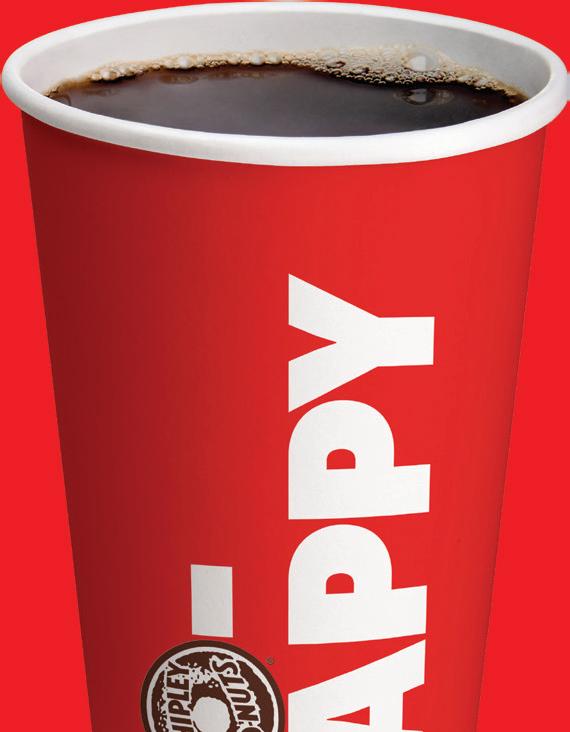





6 • December 2022 EXPRESSIONS Worship times: Sundays, 8:40 a.m. and 10:45 a.m. 220 South Webster Avenue, Norman, OK fccnorman.org Score! Shipley Do-Nuts is proud to partner with OU Student Media. www.shipleydonuts.com Do-stop-by our location today! 1805 W. Main St Norman, OK OU DAILY JOIN OUR TE AM The OU Daily is the independent student voice of OU since 1916. To get real-world experience and develop your professional portfolio, apply at OUDAILY.COM/JOBS INTERESTED IN: REPORTING EDITING PODCASTS SOCIAL MEDIA ADVERTISING MARKETING SALES PHOTOGRAPHY VIDEOGRAPHY PRINT DESIGN DIGITAL DESIGN www.oudaily.com @OUdaily @OUdaily @theoudaily
What doesn’t make the cut for Instagram
Studying abroad, in a sense, is the perfect Insta gram experience.
BALES Culture editor silasbales@ou.edu
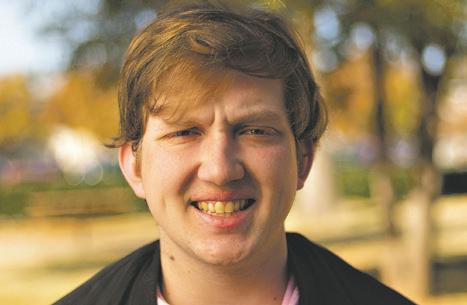
You see and immerse yourself in another coun try’s culture, eat amazing food and interact with peo ple across the globe you’d otherwise never meet.
The experience practi cally writes its own social media posts as you vaca tion from your everyday life.
But after spending two months in South Korea, I think the value of studying abroad lies in the experiences that don’t make it to social media. The quiet buzz of a morning walk to campus, the moments between the action and bustle, and even the experiences you sometimes might want to

forget. Without these experiences, studying abroad is just an extended vacation from your life back home.
One of my favorite things in South Korea was my 20-min ute morning walk to school. At 8:15 a.m., I would head out of the E-house dorm to make the trek up to Sungkyunkwan University. Seoul was already up in full force, about as busy as downtown Dallas on a Friday night. The train I would pass by multiple times on my morning walk would be packed with hundreds of people getting on and off every five minutes. A breeze cooled the morning before the sun warmed the city of innovation and pop culture, and cafes on all street corners bustled with customers.
Not a lot of people talk to each other in these moments. Instead, you are surrounded by the soothing sound of the wind, the smell of hot coffee permeating the humid air, the clicking of work shoes hitting the ground on the way to their offices and the quiet buzzing of phones all around.
It’s in these moments that I experienced one of the key takeaways from the trip: Life doesn’t slow down when you
aren’t home. There is not a single hour of the day when there isn’t something to do, see or experience.
On morning walks, I learned how to ask for directions, discovered which convenience stores were the best (which are more similar to Buc-ee’s and any 7/11 in the U.S., even though 7/11 in South Korea was the best) and where I saw some of the most interesting people. Old couples going on their morning walks just like me. A young businessman running to the station to get to work on time. A middle-aged man savoring a smoke before he opens his restaurant.
In Seoul, there was always something to do or see, and while everything seemed so normal and planned, every walk was different, with something new to see each morn ing on my way up the hill to campus.
One Saturday, I decided to venture out to the Demilita rized Zone, the border between North and South Korea. After an hour-and-a-half bus ride through the countryside of South Korea, I was disappointed when I arrived because it was too foggy to see over the border, and I couldn’t fully
December 2022 • 7 EXPRESSIONS
SILAS BALES/OU DAILY
The Seoul Queer Culture Festival in Seoul Plaza on July 16.
SILAS
experience what I set out to see. However, on the same bus ride home, I realized that, while the destination wasn’t what I expected, the journey was perhaps more interesting. I got to see the towns around the border and how they operate, often relying on local tourism generated by their closeness to the perceived danger of the border.
I found myself asking a friend, who is a South Korean local, if she was worried about North Korea. Her response put glob al politics in a whole new light and was the greatest takeaway of the day.
“Why would I be worried?” she said. “At the end of the day, we are both Korean, and I hope that we can find a way to reunite.”
This was one of the most interesting times of the trip and helped change how I viewed the rest of my experiences in the country. I started the day expecting to take many Instagramworthy border photos, but I left with greater clarity on the situa tion of the country’s divide, despite the day’s fog. I learned then that not every unique experience needs to have a post attached to it.
While social media often paints studying abroad as positive, many things I saw in South Korea made me reconcile what I al ways knew but maybe never recognized: Every place on Earth has problems, just like ours back in the relative comforts and freedoms of the United States.

South Korea is notorious for its disdain for the 2SLGBTQ+ community, and one Saturday in Seoul, I saw that firsthand. It was the day of Seoul’s Queer Culture Festival, which I was sur prised to learn existed when I stumbled upon it. The celebra tion took place on a plot of grass about half the size of a foot ball field, with tents and booths, a small stage for live music and people dancing, talking and celebrating one another.

It was like we sometimes see in Oklahoma, a small but culturally rich celebration of those who may not receive a warm welcome in their broader community.
Hordes of police created a slim barricade between the event’s attendees and the seas of protesters denouncing the 2SLGBTQ+ community. While local media outlets say protesters only slightly outnumbered the event-goers, the space they took up and the force they had was far greater. Their protest spanned multiple city blocks and included many churches, companies and families yelling at anyone who passed by.
Although I’ve witnessed some hate toward the 2SLGBTQ+ community in the U.S., the scale and fervor of it at this event eclipsed anything I’d seen or heard in my life.
That crystallized the most important thing I learned abroad: There is no such thing as the perfect place. There is no utopia, no destination you can reach forever free of any trouble. The world has lots of room to grow, no matter where you go.
Traveling abroad is a wonderful experience, and I wouldn’t trade it for the world. There is so much to see and so much culture to absorb, whether that be at an open-air market filled with foods you’ve never seen before or pro tests for the rights of 2SLGBTQ+ citizens. Whether you find yourself here in the states or abroad, the next time you step out of your comfort zone, look around and try to take in everything.
Not just the part that might end up on your Instagram page.
8 • December 2022 EXPRESSIONS
SILAS BALES/OU DAILY
Gyeongbokgung Palace in Seoul, South Korea, on July 18.
SILAS BALES/OU DAILY
The Seoul Queer Culture Festival in Seoul Plaza on July 16.
STARTHERE GO THER E












LA-based and James BeardAward-winning senior NBA writer for





"There’snobetterway to become a journalist than to practice it on a daily basis, and working at theDaily helped tremendouslyinthat regard. Iwas luckyto work along some fine students who carried themselves in an extremely professional manner, which helped elevate all of us to that level."
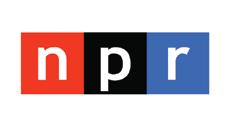

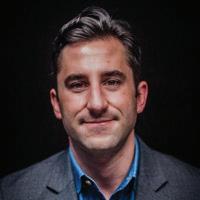



Always hiring: oudaily.com/jobs
Baxter Holmes
Academic expression, free speech on campus

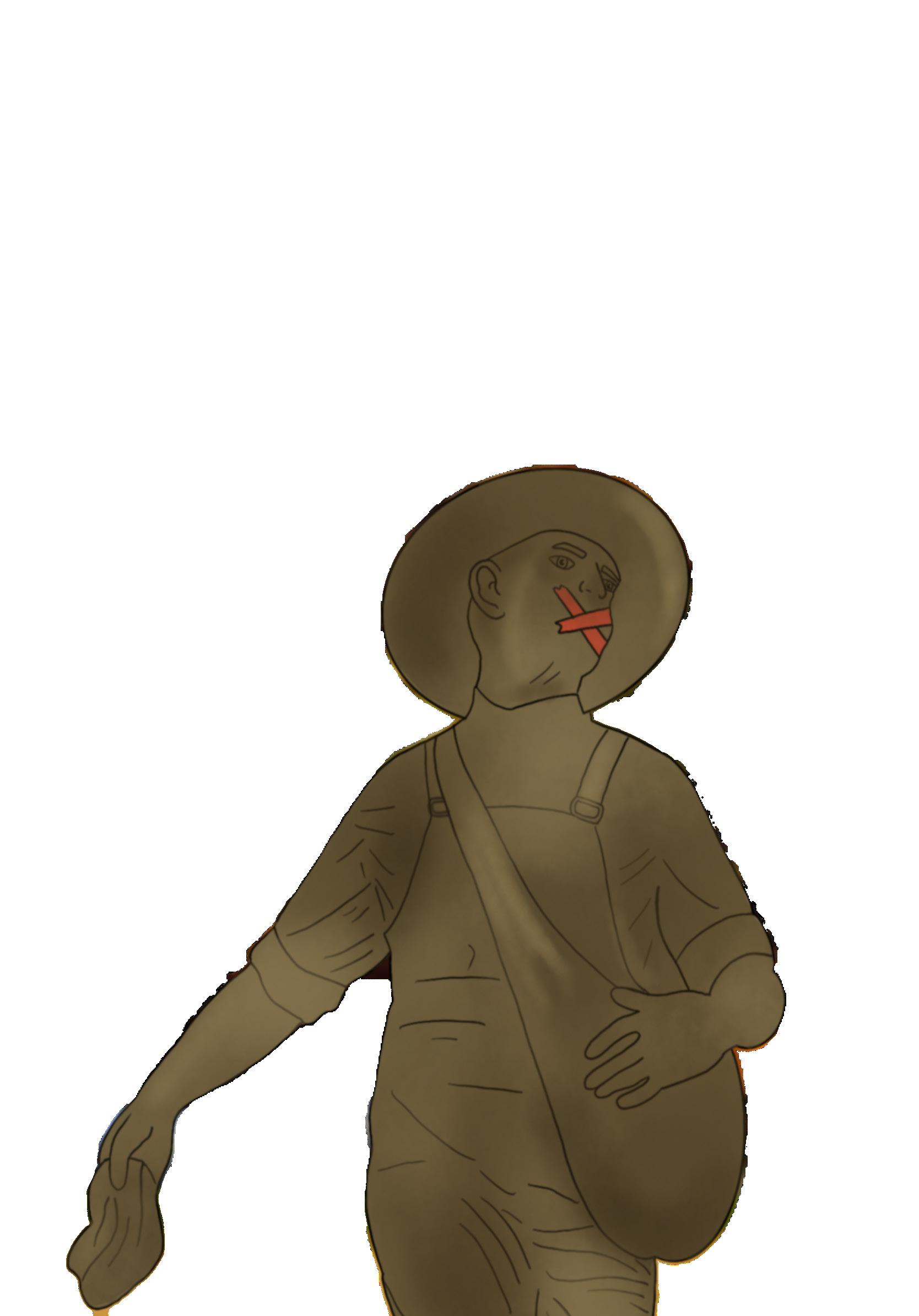 Michael Givel Political science professor mgivel@ou.edu
Michael Givel Political science professor mgivel@ou.edu

professors should be covering recognized, peer-reviewed and scholarly material in their classes. Free speech in the class is only about critically analyzing this scholarship, nothing more. And it should never be done to harass, in any man ner, anyone, including in and outside of the classroom on the basis of race, gender, sexual identity, religion, national origin, political beliefs, etc.
Indeed, related to AAUP, academic freedom has long been recognized by OU to cover all topics in a scholarly manner in classrooms, includ ing what some deem as controversial. In the OU Faculty Handbook, Section 3.2.1 has codified this important principle based on “The 1940 Statement of Principles on Academic Freedom and Tenure with 1970 Interpretative Comments of the American Association of University Professors.”
Academic freedom, as defined by the Faculty Handbook, guar antees faculty members full free dom in research and publica tions without outside political or other interference. The right to cover and discuss recognized scholarly material pertinent to the subject of a class, such as racism, sexism or discrimina tion based on sexual identity, is a cornerstone of academic freedom. Moreover, faculty
10 • December 2022
members are guaranteed the right and even the duty to speak as private citizens on current issues. They also have the right to engage in political advocacy and run for nonpartisan political offices, including that this officially counts as employment-re lated service to the community. It is incumbent for OU to pro vide the conditions for a full range of views, even ones that are unpopular.
The subsequent section in the Faculty Handbook related to academic freedom concerning faculty responsibilities provides explicit guidance related to this.
First, faculty members must practice intellectual honesty. And most importantly, Section 3.2.2 (B) indicates: “As teachers, faculty members encourage the free pursuit of learning in their students. They hold before them the best scholarly and ethical standards of their discipline. Faculty members demonstrate respect for students as individuals and adhere to their proper roles as intellectual guides and counsel ors. Faculty members make every reasonable effort to foster honest academic conduct and to ensure that their evaluations of students reflect each student’s true merit. They respect the confidential nature of the relationship between faculty mem ber and student. They avoid any exploitation, harassment, or discriminatory treatment of students. They acknowledge sig nificant academic or scholarly assistance from them. They pro tect their academic freedom.”
In other words, this is a call for the rigorous encourage ment and pursuit of intellectual inquiry in tandem with pro viding an objective evaluation of the true merit of that student
performance in the form of grades and other forms of class room evaluation. Academic freedom and the responsibility for student learning should not be predicated, for instance, on ad hoc individual student requests to raise a grade on an assign ment or test when no one else in the class is afforded that same opportunity.
What, then, are the similarities and differences of the Chicago Statement that was recently promoted during Free Speech Week at OU? The Chicago Statement was adopted by the University of Chicago in 2014 based on a report by the Committee on Freedom of Expression in 2014.
The principles set forth in the Chicago Statement are some what different from academic freedom. The statement takes a fairly absolutist and libertarian position on unfettered free speech on campus. Its intent is primarily to ensure all free de bate and viewpoints are allowed in a general campus environ ment. The key exception is this:
“The freedom to debate and discuss the merits of competing ideas does not, of course, mean that individuals may say what ever they wish, wherever they wish. The University may restrict expression that violates the law, that falsely defames a specif ic individual, that constitutes a genuine threat or harassment, that unjustifiably invades substantial privacy or confidentiali ty interests, or that is otherwise directly incompatible with the functioning of the University. In addition, the University may reasonably regulate the time, place, and manner of expres sion to ensure that it does not disrupt the ordinary activities of the University. But these are narrow exceptions to the general
principle of freedom of expression, and it is vitally important that these exceptions never be used in a manner that is incon sistent with the University’s commitment to a completely free and open discussion of ideas.”
The Chicago Statement notes that calls and requirements for “civility” and tone-policing of ideas is an abuse of administrative and political power and discretion. “Civility” and tone-policing should not be used as a gambit to shut down certain ideas, dis cussions or debates, even if some at a university believe them to be “offensive, unwise, immoral, or wrong-headed.”
However, general requirements for free speech in a general campus forum, as provided by the Chicago Statement, are not entirely congruent with academic freedom in the classroom. In the classroom, professors have a responsibility to provide the highest quality recognized scholarly excellence. Students should be encouraged to analyze that material in a careful and critical academic manner. For some students, this can push the envelope in terms of personal comfort, in relation to analyzing scientific publications and scholarly material they may have never previously considered.
One thing is for certain with all of this: The atmosphere in and out of the classroom should never consist of personalized harassment of the professor or students. Never. OU and the campus community have a responsibility to respond, promote and even defend academic freedom in the event this occurs. In this way, students will best enhance their learning and compre hension in terms of their ongoing mastery of academic subject areas.
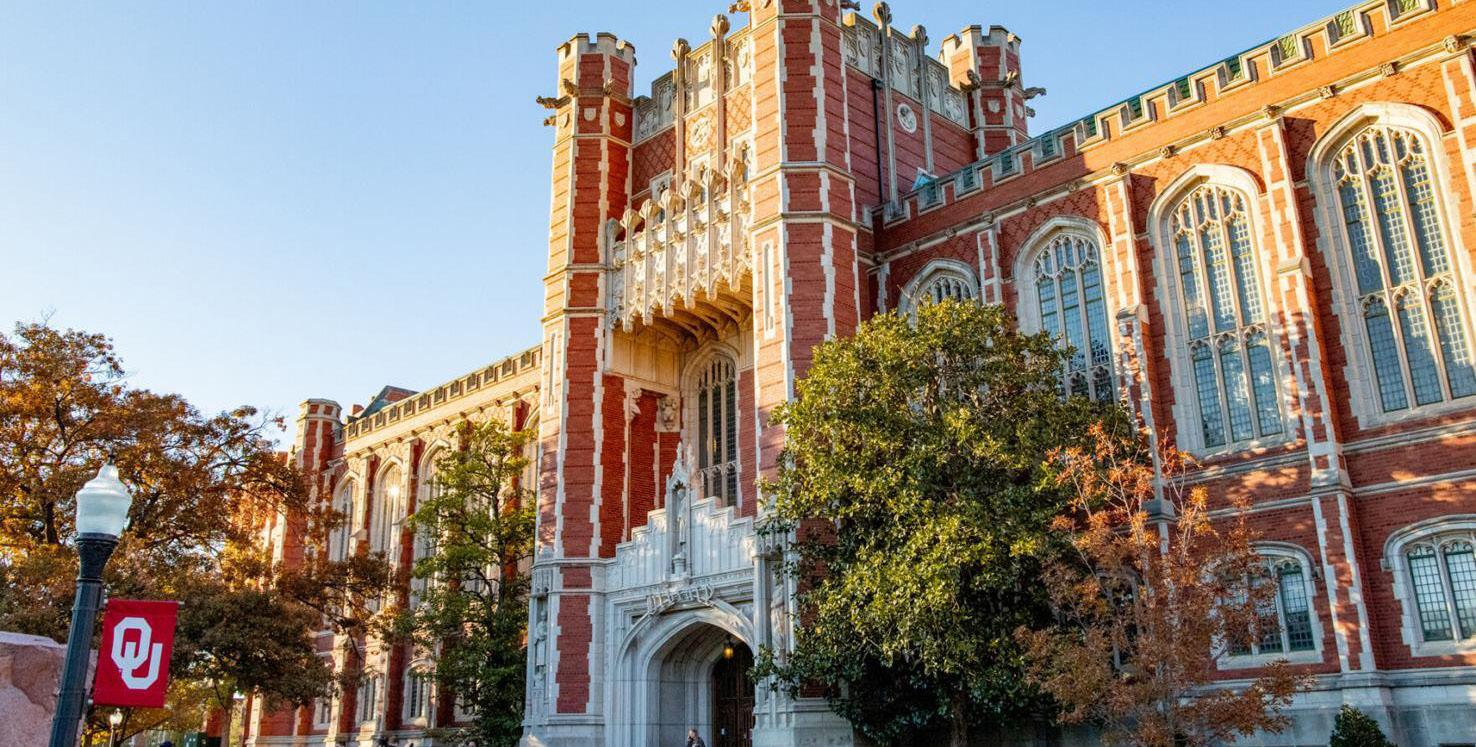
December 2022 • 11
EXPRESSIONS
AUDREY QUAN/OU DAILY
Bizzell Memorial Library on Nov. 22.
2022 highlight reel





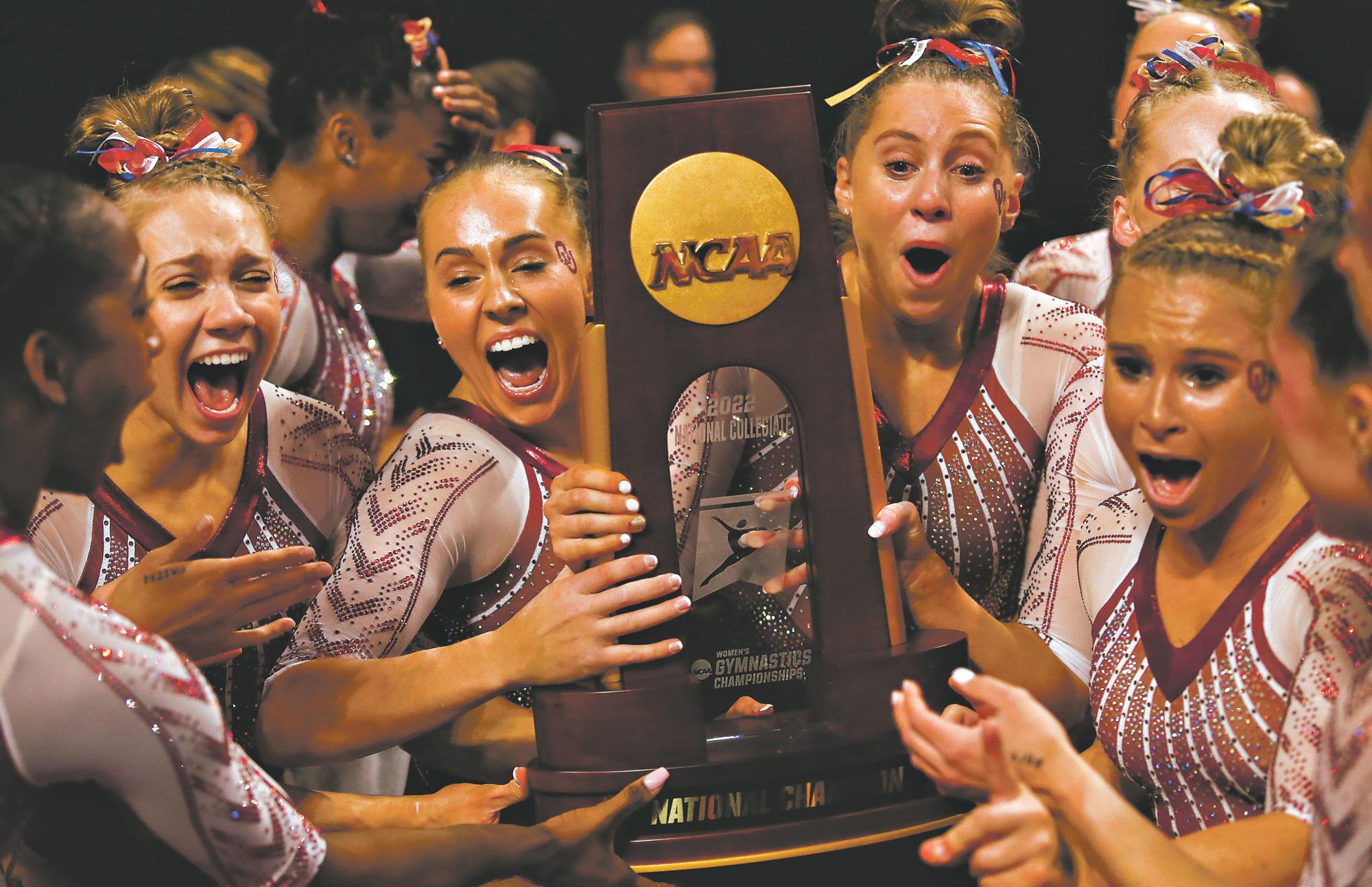
12 • December 2022 EXPRESSIONS
RAY BAHNER/OU DAILY
The Sooners celebrate after the 2022 NCAA women’s gymnastics championship final on April 16. Demonstrators
RAY BAHNER/OU DAILY
The Sooners after winning the Women’s College World Series on June 9.
OLIVIA LAUTER/OU DAILY
Protesters during NNHS protest for trans rights on Oct. 21.
REGHAN KYLE /OU DAILY
Redshirt freshman pitcher Cade Horton on June 26.
RAY BAHNER/OU DAILY
Junior wide receiver Marvin Mims Jr. on Nov. 26.
TREY YOUNG /OU DAILY King Pink performs during Norman Music Fest on April 28.
Hear the cries of injustice in Iran
An increasing concern for some college stu dents across the U.S. is the equality of all people in legislation, public pol icy and social standards, and eradicating any in justice that may occur on the basis of gender, sex or religious affiliation. For this reason, it is import ant to call attention to the distressing state of injustice, and women’s and human rights violations that have occurred in Iran for over 40 years now. The Iranian people, especially women, have been facing un speakable violence for actions and activities which we, in the U.S., consider prosaic and commonplace. Imagine a country where women are prohibited from singing, dressing how they desire, attending sporting events, making decisions without a male “guardian” and achieving fair trials against men in civil courts.
This is the current day Islamic Republic of Iran. It is also im portant to note that no one, regardless of gender identity, re ligious or political affiliation, is permitted to openly refute the
actions of this tyrannical government. This is where your help, as an OU student, international student, human rights activist, women’s rights activist and human, comes into play.
On Sept. 13 of this year, Mahsa Amini, a 22-year-old woman, was walking the streets of Tehran with her family, unaware of the events that would follow shortly after. She was arrested and held by the police for several days and, following her de tention, died on Sept. 16. While the Islamic Republic of Iran claim she was treated justly and humanely while in custody, evidence and witnesses indicated she suffered from violent blows to the head and limbs, from which she passed away. The morality police and government were not ready for the aftermath that followed their barbaric acts. Since news broke of her death, the streets of Iran have been ridden with pro testers, hundreds of whom have been killed, and people are growing increasingly intolerant of this oppressive treatment. Iranian youth are only asking for basic liberties, and, in re sponse, are met with tear gas, tasers, bullets, imprisonment, rape and torture.
To bring this issue closer to home, consider that the Iranian students at OU make up the fifth-largest group of interna tional students on campus as of 2021. Some arrived here less than one year ago in pursuit of higher education and liberty. Instead of having warm thoughts of their families in Iran as they settle in, they face heartbreaking news about the state


of their country in continuous chaos. For many Iranian stu dents, academics have, understandably, taken the backburn er to keeping this movement alive and preventing it from los ing media coverage or reaching stagnation. At the same time, many Iranian students have been forced into caution about their modes of activism. Social media activism, or uncensored photos of them at protests and rallies, could mean putting their families in danger and facing repercussions upon their return home. For this reason, the Iranian community at OU, and around the world, needs the international community, including the students at OU, to be their voice.
If you consider yourself an advocate for human rights and women’s rights and want to support the Iranian students at OU, now is the time to make a difference. To support this movement against a repressive regime, spread the news through social media. It could be something as “small” as posting a news article on your Instagram story. Talk about it with your friends and family. Call your state and federal rep resentatives to inform them about the ongoing human rights violations in Iran and the urgent need for attention. Attend protests and rallies, which occur frequently on campus and in Oklahoma City. Stand by your Iranian friends, teachers and peers. Hear their stories with an open mind and understand that your support and activism can and will make a difference.
December 2022 • 13 EXPRESSIONS
REGHAN KYLE/OU DAILY
Demonstrators during a protest against violence toward Iranian women in Norman on Sept. 22.
Carmen Lessani Iranian Student Association president carmenlessani@ou.edu
‘From 2020 On’: Pandemic years in review
had everyone becoming crewmates. The deception game is still widely revered and streamed. It’s a triumph of summer blockbuster hits and one of the greatest achievements of humankind.
“Squid Game”: 9/10
“Squid Game” director Hwang Dong-hyuk managed to pull off the unthinkable: a small-budget show that took the world by storm and made almost $1 billion in profits. The show is a streaming service’s dream come true. It delivered a fantas tic story that is popular, for good reason, but strangely made viewers dream of playing in this brutal, fictional game show. Did anyone who watched “Squid Game” understand that the game was pure evil?
The children want pop-its: 7/10
It’s really not another year if we don’t get the next toy craze. Infinite bubble wrap, or “Pop Its,” was what the kids wanted. A lazy, but satisfying, sequel to fidget spinners and cubes. While I miss the days of “Sillybandz” and Pokémon cards, I’m always looking forward to the next fidget toy.
Five letters, six tries: 9/10
Creating a small internet game is no easy feat. But creating a game that would quickly be purchased by The New York Times and played by millions worldwide is quite the achieve ment. “Wordle” became the next big thing overnight, spawn ing many spin-offs like Worldle and Quordle. Josh Wardle created a masterpiece of his time without even knowing it. Except, he probably knew after being offered a huge sum and seeing everyone rage over or celebrate their results online.
Harry spit on who?: 3/10
OU’s Bad Movie Club watches and reviews the worst of Hollywood films. The group prides itself on being a “safe space for judgement,” according to its ENGAGE page.

“From 2020 On” is an unprecedented mess with some unexpected twists and turns, making for a unique watch with a phe nomenal cast of cultural moments. Join OU’s Bad Movie Club in reviewing some of the best and worst pop culture events of the new decade.
Marvel shows: 8/10 “Avengers: Endgame,” which made almost $3 billion in box office sales, was a great ending to the “Infinity” saga. But, after the COVID-19 pandemic shut down theaters where Marvel action scenes came to life, many wondered what the future would hold for the franchise. Marvel showed no signs of slow ing down and continued to pump out content. “WandaVision” provided some big-budget entertainment in 2021 that can be watched from the comfort of home, and “Spider-Man: No Way
Home” broke the box office again nine months later with three generations of Spider-men. The franchise adapted well, and Marvel Studios is promising a great lineup of shows in years to come.
Imagine all the people: 2/10
Gal Godot posted a montage of her and other celebrities singing “Imagine” by John Lennon when the pandemic began to soothe the worrying masses. It was one of the funniest mo ments I’ve seen. They thought they were doing good but in stead came across as singing about how awful life is as million aires. Imagine if they knew the irony of the situation.
Politicians are comedians: 8/10 American politicians put on quite the comedy show. President Joe Biden had some standout dialogue, including a major highlight when he yelled, “Will you shut up, man” to former President Donald Trump. His falling down the stairs bit, Mike Pence’s fly-on-the-head trick and Bernie Sanders’ mitten moment proved that physical comedy is not dead.
Imposter syndrome: 10/10
“Among Us,” a game that broke the internet, added the word “sus,” short for suspicious, to the Generation Z vernacular and

It’s one of the greatest mysteries of our time. “Don’t Worry Darling” had everyone scratching their heads. The whole movie seemed doomed to fail as controversy started to rise. Actor Shia LaBeouf was supposedly fired, director Olivia Wilde said some questionable things and lead actress Florence Pugh was oddly silent about the film’s release. I was on the edge of my seat wondering if Harry Styles actually spit on Chris Pine or who was to blame for this mess of a movie.
Verified for $8: 1/10
Baffling, funny and downright stupid. That’s the tweet. Elon Musk purchased Twitter, made an $8 subscription service and promised to ban every single parody account. Instead of do nating $44 billion to a great cause, he ran the company into the ground. Mass layoffs were an awful twist, and everyone’s wondering which social media platform will serve as Twitter’s successor.
Taylor Swift to the rescue: 9/10
Taylor Swift released a lot of great albums, including “folk lore,” “evermore” and “Midnights,” along with some rere leases, like “Fearless (Taylor’s Version)” and “Red (Taylor’s Version).” Swift continues to smash charts and hearts. The era of music ended with a ticketing debacle for her long-awaited tour. It was a unique twist that many saw coming but weren’t too happy about. The aftermath was devastating, leaving many tired and ticketless fans. A heart-wrenching ending to a fantastic performance.
14 • December 2022 EXPRESSIONS
Cooper Marshall Bad Movie Club co-president cooper-r-marshall-1@ou.edu
WIKIMEDIA COMMONS
OU DAILY ARCHIVES, APRIL 2, 2003
CALENDAR
Andrews Park Community Tree Lighting
• 5:30 p.m.
• Dec. 9 Final examinations
• Dec. 12-15 Hanukkah
• Dec. 18-26 Christmas
• Dec. 25 Norman Christmas Day Community Dinner
• 11 a.m. to 2 p.m.
• Dec. 25
24 YEARS AGO AT OU
Affirmative action case rekindles discourse
This fall, the U.S. Supreme Court began hearing two cases concern ing universities’ ability to use race as a factor for admissions, allowing for what the American Civil Liberties Union described as “race-con scious admissions practices.”
Affrmative action was established in 1965 when President Lyndon B. Johnson issued Executive Order 11246, which prohibited federally funded organizations from discriminating on the basis of race, reli gion or national origin.
Now, the Supreme Court is debating the constitutionality of affrma tive action, with proceedings focusing on how diversity in education can be achieved without needing to take race into account in the admissions process.
Oklahoma voters approved State Question 759 in 2012, which banned affrmative action in state government hiring, public contract ing and higher education. Before the vote, OU preemptively shifted its admissions process to be more “holistic,” according to a statement from the Oklahoma Advisory Committee to the U.S. Commission on how affrmative action has affected civil rights in the state.
In 1998, a student at the University of Tulsa fled a lawsuit against the Oklahoma Regents scholars program, saying that affrmative action discriminates against white men. Shortly after, two of OU Daily’s col umnists debated the topic in the publication’s weekly point-counter point feature. Point-counterpoint was published almost every Friday and featured two opinion columnists providing separate viewpoints on given topics ranging from political affairs to pop culture.

Columnist Marshall Camp argued in favor of affrmative action, writ ing that the U.S. has a long history of oppressive language and moti vations. Camp wrote that affrmative action allows for more diversity in college admissions, and, as seen in previous years at other institu tions described by Camp, the lack of affrmative action is apparent in the decreased number of students of color.
“America’s history is one in which rhetoric of equality has often belied a reality of oppression. … But to achieve fairness we must judge individuals separately, and we must give all Americans a quali tatively equal chance to achieve and excel,” Camp wrote.
Taking the counterpoint, columnist Robyn Conder argued that affrmative action does more harm for minorities than good. Conder wrote that, in principle, affrmative action is racist and sexist, as it is aimed at giving opportunities to historically marginalized communi ties over others.
“Most dangerous of all, (affrmative action) sends the message that women and minorities are inferior to white men,” Conder wrote. “It tells the protected groups they aren’t good enough to compete on a level playing feld, and they can only reach an equal level if they are given a head start.”
Camp and Conder agreed in their columns that affrmative action, at its core, needs to be reformed and that historically marginalized communities do receive fewer opportunities than white people. Camp and Conder disagreed on their stance of whether affrmative action is needed or if it causes more harm.
• Norman High School Commons Cafeteria Kwanzaa
• Dec. 26-Jan. 1
OU men’s basketball v. Texas
• Dec. 31
• Lloyd Noble Center
Martin Luther King Jr. Day
• Jan. 16
Spring semester begins
• Jan. 17
Women’s gymnastics v. Utah
• 6:45 p.m.
• Jan. 22
• Norman
December 2022 • 15 EXPRESSIONS
-
Staff reports
Protesters join in a rally on the steps of the U.S. Supreme Court as arguments are heard in two cases challenging the University of Michigan’s affirmative action admissions policies.
SOCIETY OF PROFESSIONAL JOURNALISTS



FIRST AMENDMENT AWARD WINNER
Competing against professionals, the OU Daily was presented the 2022 Carter Bradley First Amendment Award, for work that aimed to reset norms around transparency at OU and in Norman. Its winning entry included stories that:
Examined how the university handles records requests, including response times in comparison to other universities and resources available to the
Broke down
data from the Nor man Police Department to show on a per capita basis, the city’s Black residents were three times more likely than their white neighbors to be contacted, arrested or have force used against them by the police.
Monitored the football team’s quarterback controversy via the jour nalism school windows near
athletic department to institute a 72-hour national media blackout.
OKLAHOMA
oudaily.com































 Michael Givel Political science professor mgivel@ou.edu
Michael Givel Political science professor mgivel@ou.edu















